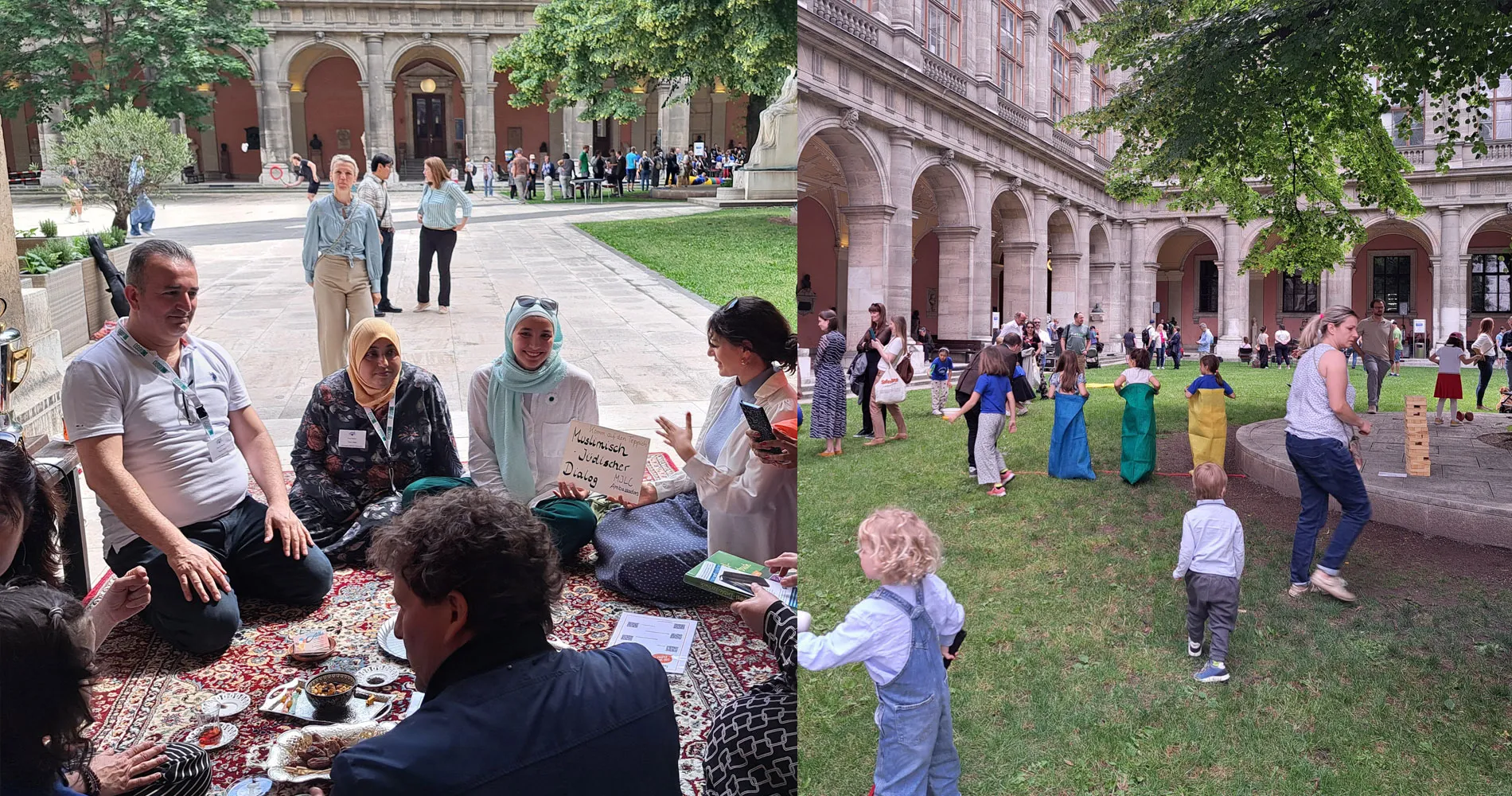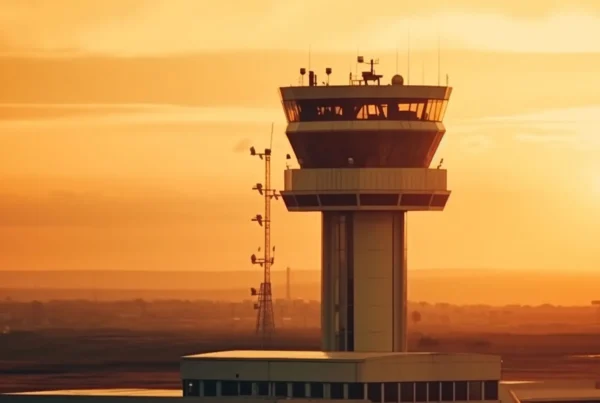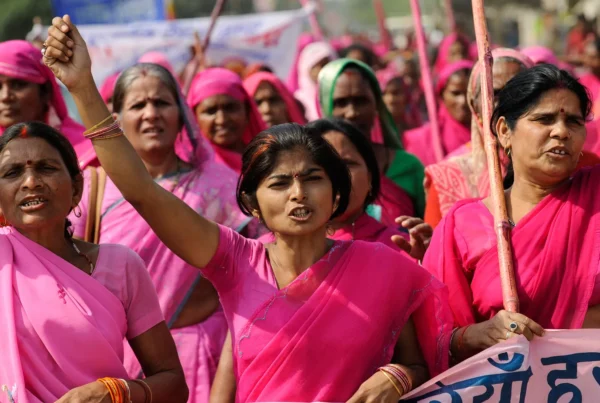The spirit of interreligious dialogue was rekindled in Vienna on 26 May 2024 during the Festival of Religious Minorities and Cultures. In a world where religion is instrumentalized to stir up hate and justify wars, this event brought together Muslim, Jewish, Christian and Buddhists faith groups and communities. Religions have an important and positive role to play, which was highlighted by the festival’s motto of peace.
Meric Sentuna Kalaycioglu
8 July 2024
Arabic version
Under the auspices of Vienna’s Mayor Michael Ludwig, an impressive coalition of religious groups, including the Alevi community, the Old Catholic Church, the Buddhist Religious Society, the Evangelical Churches (Augsburg and Helvetic Confessions, Methodist), the Free Churches in Austria and the Islamic Religious Community, in collaboration with the Ecumenical Youth Council of Austria organized the Festival of Religious Minorities and Cultures, the first of its kind. The doors of the Arkadenhof at the University of Vienna opened to the public on a sunny Sunday afternoon at 14:30. This unique and heartwarming gathering ran until 21:00.
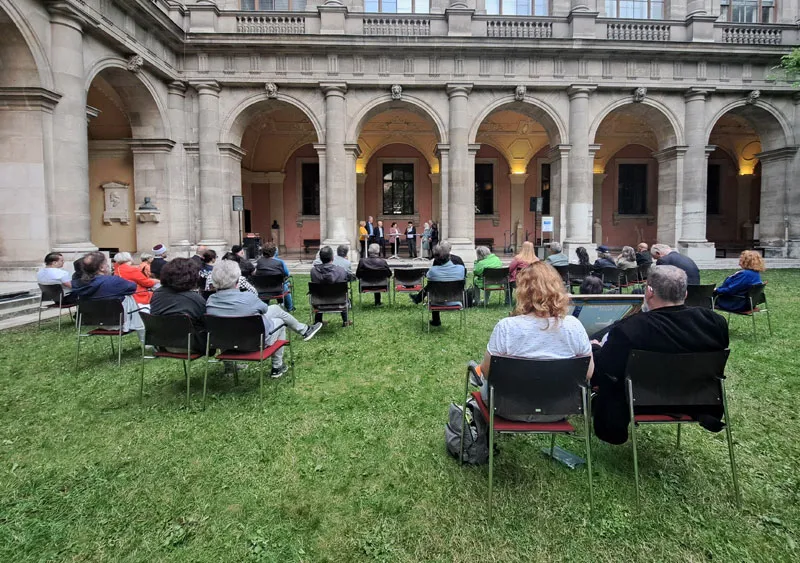
Participating religious groups featured stands encouraging dialogue and community. Carla Amina Baghajati, the head of the school district (Schulamtsleiterin) and specialist inspector for Islam, was enthusiastic about the choice of venue at the University of Vienna. She told iGlobenews that they were delighted to gather at such a special place, as universities symbolize a secular approach and maintain neutrality towards all religions while still cherishing religious freedom. She felt this to be especially important in times when many people are worried about hatred, societal bias, ongoing wars, climate change, and economic crises. These issues accumulate into a “mountain of sorrows and concerns,” she noted.
Ms. Baghajati expressed concern that religions are often portrayed as contributors to these problems. However, she insisted on an open-minded approach, urging dialogue and understanding. “Let’s show that religions are not troublemakers, but rather those that might be a factor in reconciliation and better mutual understanding and respect,” she said. This belief, she explained, underpins an understanding of religion and is why the festival’s motto is peace. She highlighted that this message of peace is crucial in demonstrating the positive role religions can play in society.
Interaction between people from different religious and cultural backgrounds was further encouraged with the “Come on the Carpet” stand. Their mottos were “exchange”, “dialogue on various topics”, “discover togetherness” and “what I have wanted to ask for a long time”. Guests were invited to sit on the carpet and enjoy tea, Turkish coffee and sweets served by the delegation of the Islamic Religious Community.
 Guests on the Carpet
Guests on the Carpet
 The invitation to the Carpet and its mottos.
The invitation to the Carpet and its mottos.
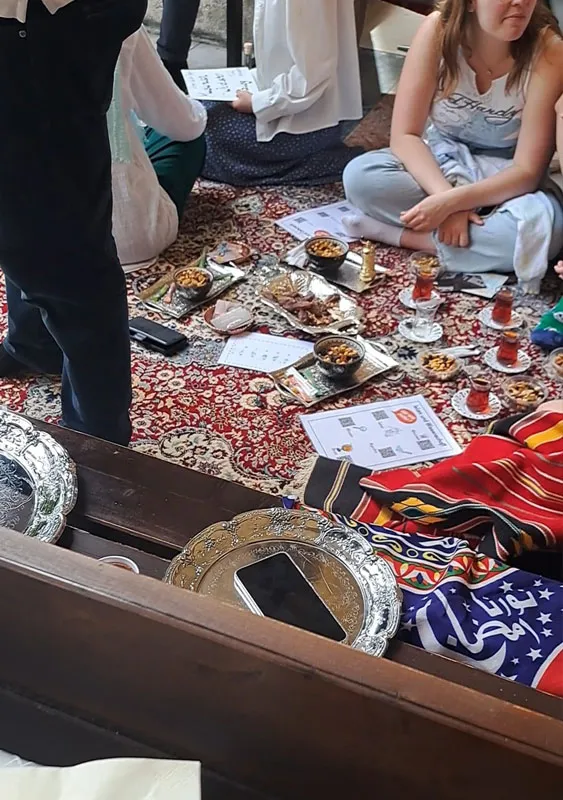 Guests on the Carpet
Guests on the Carpet
The Carpet featured two special guests: Eidel Malowicki and Hind Hafuda from the European Muslim and Jewish Leadership Council (MJLC). Since its establishment in 2015, the Council has operated at a solely European level with the mission of renewing a culture of respect and appreciation of religious identities, specifically Judaism and Islam in Europe. MJLC’s two young ambassadors mentioned that they celebrate their similarities by finding Muslim-Jewish junction points and emphasized their role in fostering good cooperation in society and creating a beautiful common ground of peace.
 Eidel Malowicki and Hind Hafuda from the European Muslim and Jewish Leadership Council (MJLC)
Eidel Malowicki and Hind Hafuda from the European Muslim and Jewish Leadership Council (MJLC)
Choirs from different age groups and cultural backgrounds sang songs in German, English and Turkish. The opening performance featured a remarkable choir of 80 students from the Evangelical Elementary School at Karlsplatz, followed by another student choir from the Old Catholic Elementary School Triangel Marchtrenk. The event turned out to be a family festival, thanks to the parents of those students.
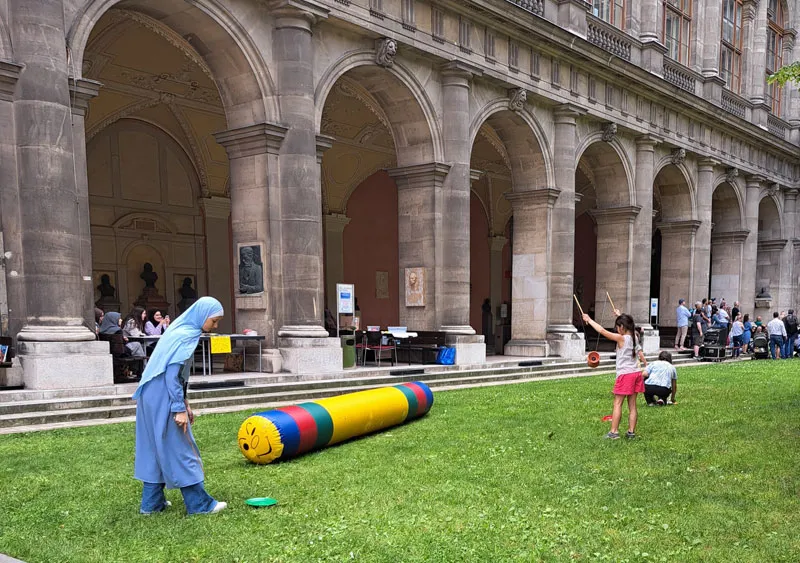 Children playing.
Children playing.
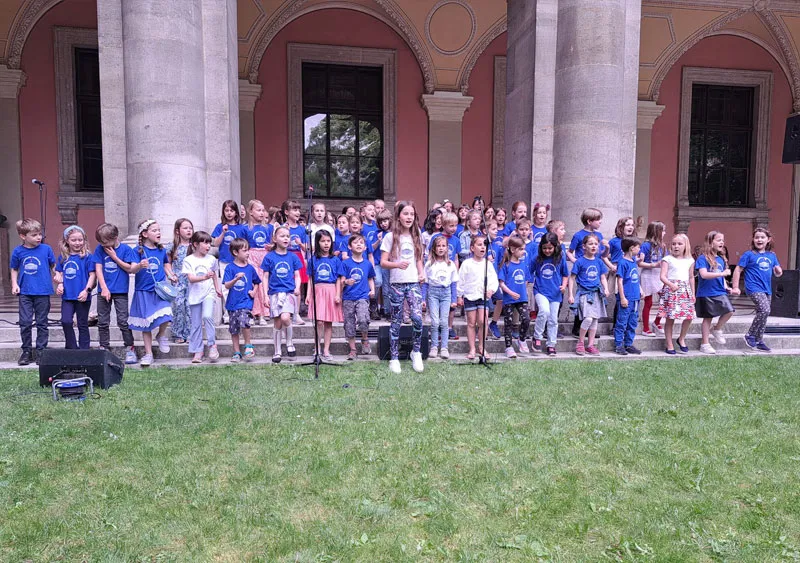 The choir of the Evangelical Elementary School at Karlsplatz
The choir of the Evangelical Elementary School at Karlsplatz
Children of all ages also engaged in open dialogue and mutual respect through interactive games, a riddle rally, and a crafting table. The festive spirit was amplified by a splendid array of multicultural delicacies. These showcases exemplify the festival’s spirit, as noted by Katja Eichler, specialist inspector for the Evangelical Augsburg Confession group, who said, “we need to know a lot about each other and never lose [an opportunity] to talk to each other”.
The Gospel Project, an independent and non-church affiliated adult choir, performed in their white, neon-orange and pink outfits. Wolfgang Wehner, performed solo on a Hang, an instrument like a handpan, based on the Caribbean steelpan instrument. One of the most interesting performances was by the Rahmi Oruc Tekke ensemble. They offered Sufi traditional sounds with lyrics based on Yunus Emre and Mevlana Rumi. At the end of their performance, the lead singer Gernot Galib Stanfel synthesized Islamic motifs with yodeling, embodying a harmonious blend of cultural traditions and showcasing the potential for unity and innovation within the diverse musical landscape.
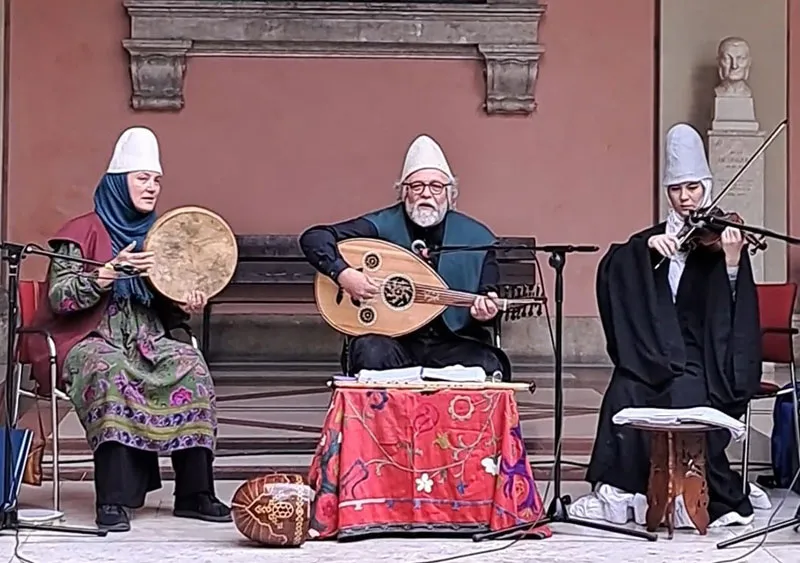 Rahmi Oruc Tekke ensemble: Friderica Magdalena Wächter-Stanfel, Gernot Galib Stanfel and Nükhet Maria Stanfel (from left to right)
Rahmi Oruc Tekke ensemble: Friderica Magdalena Wächter-Stanfel, Gernot Galib Stanfel and Nükhet Maria Stanfel (from left to right)
 Gospel Project
Gospel Project
The festival included a 30-minute panel discussion. Moderated by Astrid Mattes, representatives from various Viennese churches and religious communities discussed whether interreligious engagement is merely an “elite project”. The panelists included Superintendent Matthias Geist (Evangelical Augsburg Confession), Bishop Maria Kubin (Old Catholic), Chairman Franz Gollatz (Free Churches), Willy Weisz (Jewish Community), Carla Amina Baghajati (Islamic Community), General Secretary Johannes Kronika (Buddhist Society) and Yeliz Luczensky (Alevi Community). They collectively concluded that educating people about different religions, and understanding one’s own faith roots are essential for making informed personal choices and promoting harmonious living. Kronika highlighted that interreligious dialogue exemplified “good coexistence,” while Geist noted its indispensable yet challenging nature. Weisz stressed the importance of respectful conversations without the intent to convert, emphasizing a mutual exchange of beliefs.
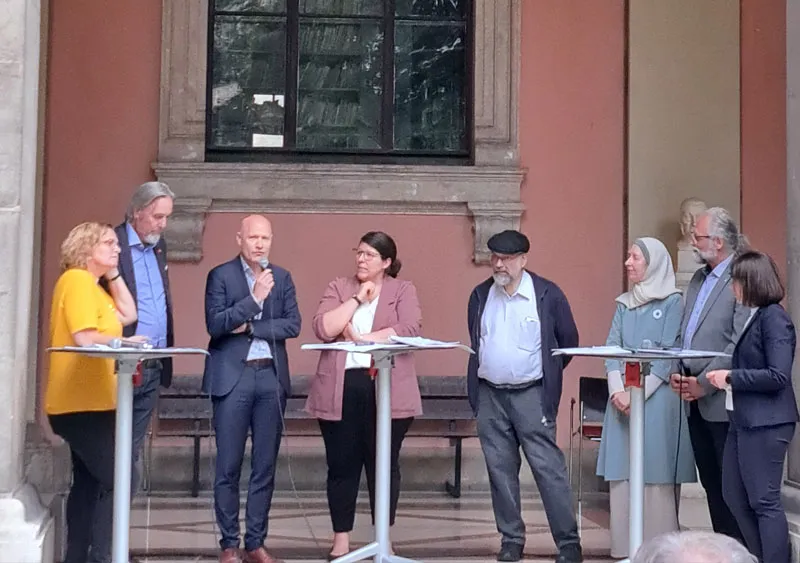 Podium discussion: Maria Kubin, Johannes Kronika, Matthias Geist, Astrid Mattes, Willy Weisz, Carla Amina Baghajati, Franz Gollatz and Yeliz Luczensky (from left to right)
Podium discussion: Maria Kubin, Johannes Kronika, Matthias Geist, Astrid Mattes, Willy Weisz, Carla Amina Baghajati, Franz Gollatz and Yeliz Luczensky (from left to right)
The festival concluded on a high note with musical performances by Dilara Caman, Duru Berca Gül and Seher Gün, who played traditional Alevi tunes on the organ and dede sazi (a traditional 3-stringed instrument) and sang along.
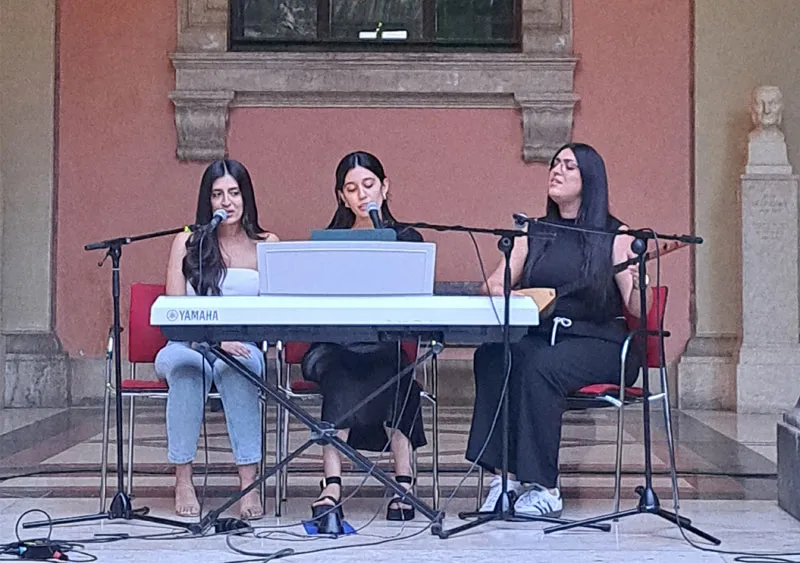 Dilara Caman, Duru Berca Gül and Seher Gün (from left to right)
Dilara Caman, Duru Berca Gül and Seher Gün (from left to right)
At 21.00, with fewer than twenty visitors, the festival concluded with a peace impulse, gathering the visitors together in a circle to mark the symbolic closing with a sense of unity and shared purpose. The closure was sealed with Peter Rosseger’s poem “Ein bischen mehr Friede” (A little more peace), recited by Carla Amina Baghajati. This event not only celebrated cultural and religious diversity, but also reinforced the idea that religions significantly contribute to harmonious coexistence, echoing the sentiment that doing good and sharing these acts fosters a more inclusive society.


